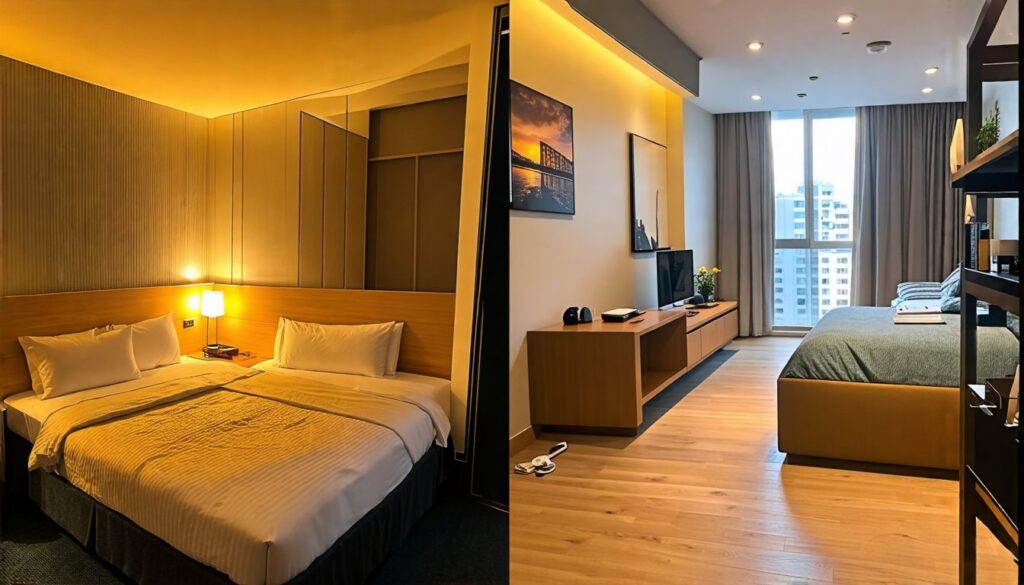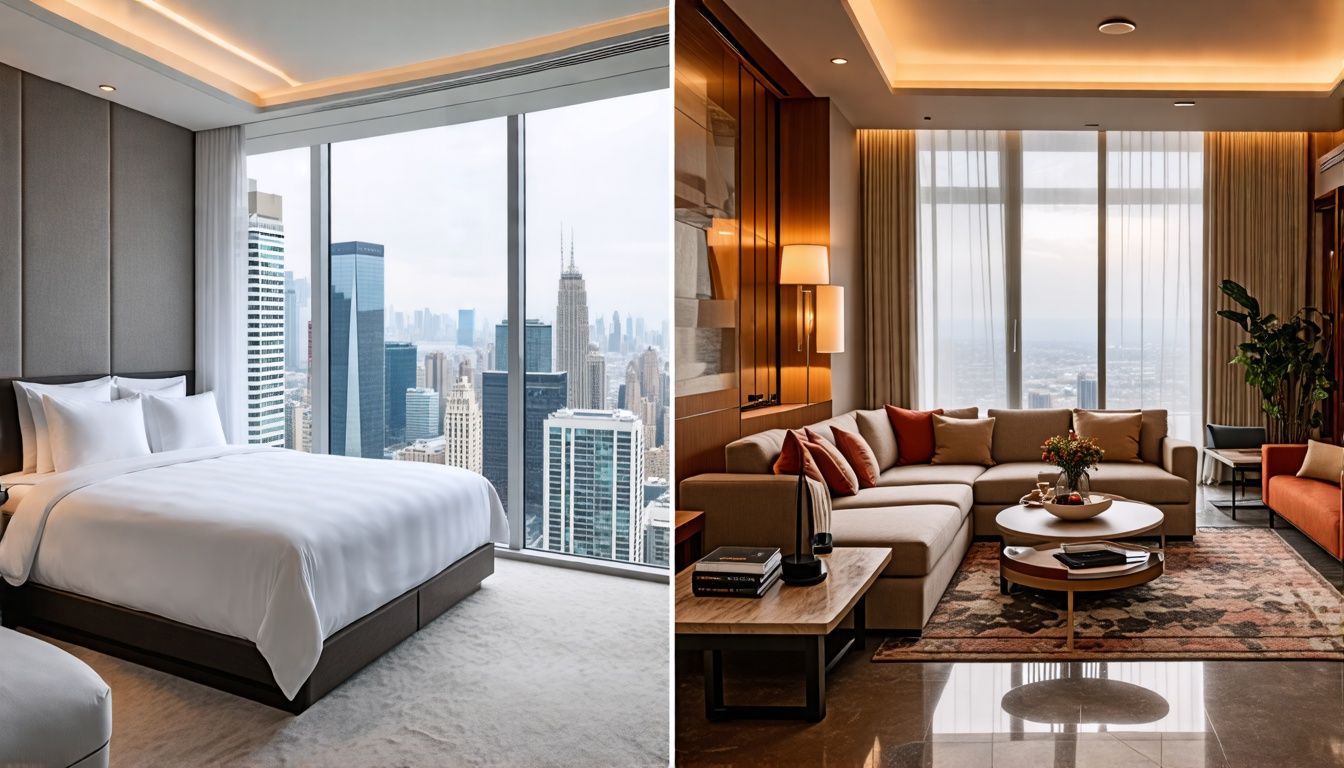Understanding Hotel vs Apartment Living
Hotel and apartment living offer distinct experiences for renters. Hotels provide temporary stays with amenities like daily housekeeping and on-site restaurants. Apartments, on the other hand, offer a more residential feel with self-contained units in larger buildings.
Serviced apartments bridge the gap, combining hotel-like services with apartment-style living. They typically boast 30-50% more space than hotel rooms, making them ideal for extended stays.
Choosing between a hotel and an apartment depends on your needs., but in this article, we will help you decide between staying in a hotel or renting an apartment.
What are the differences between hotels and serviced apartments?

Choosing between hotels and serviced apartments can be a game-changer for your living experience. Let’s break down the key differences to help you make an informed decision.
| Feature | Hotels | Serviced Apartments |
| Space | Limited room size | 30-50% more space |
| Kitchen | Usually none | Fully equipped |
| Length of stay | Short-term | Extended stays |
| Privacy | Less private | More private |
| Living experience | Temporary, transient | Residential, home-like |
| Amenities | Standard hotel offerings | Home-like facilities |
| Autonomy | Limited | Self-sufficient living |
Now that we’ve laid out the differences, let’s dive into the pros and cons of hotel living.
Space
Living in a hotel or apartment? Let’s talk space. Serviced apartments typically offer 30-50% more room than hotel accommodations. This extra square footage makes a world of difference, especially for long-term stays.
You’ll have separate areas for sleeping, lounging, and cooking – a true home away from home. It’s like having your cake and eating it too!
Space is the breath of art. – Frank Lloyd Wright
Corporate lodging apartments take it up a notch. They provide distinct bedrooms, living rooms, kitchens, and bathrooms. This layout grants ample personal space and privacy, perfect for those who value their alone time or need to work from home.
Plus, with all that extra room, you can finally practice your interpretive dance moves without knocking over the lamp!
Length of stay
Transitioning from the discussion on space, let’s explore how length of stay impacts your decision between hotel and apartment living. Hotels typically cater to short-term guests, offering flexibility for those on brief trips or vacations.
Apartments, particularly Peterborough serviced apartments are the ideal ones for extended stays. They provide a home-like atmosphere, allowing you to settle in for weeks or months.
Serviced apartments offer 30-50% more space than hotel rooms, making them ideal for longer residencies. This extra room becomes crucial as time passes, giving you breathing space and comfort.
Unlike hotels, where you might feel cramped after a few days, apartments let you spread out and truly make the space your own. For those eyeing corporate lodging or extended stays, apartments often prove more cost-effective and comfortable in the long run.
Property’s rating
Property ratings play a crucial role in distinguishing hotels from apartments. Hotels often use star systems, ranging from one to five stars, to indicate their quality and facilities.
These ratings reflect factors like service level, room size, and available facilities. Apartments, on the other hand, typically don’t follow a standardized rating system. Instead, they’re evaluated based on location, condition, and included features.
This difference can make comparing hotels and apartments tricky for renters.
For those eyeing extended stays, understanding these rating disparities is key. A 4-star hotel might offer daily housekeeping and room service, while a high-end apartment could provide more space and a fully-equipped kitchen.
Serviced apartments bridge this gap, offering hotel-like facilities with apartment-style living. They generally provide 30-50% more space than hotel rooms, making them a comfy choice for longer stays.
Ultimately, the choice between hotel and apartment living hinges on personal preferences for space, autonomy, and lifestyle needs.
Amenities
Hotels and apartments offer vastly different amenity packages. Serviced apartments typically provide 30-50% more space than hotel rooms, giving you room to breathe during extended stays.
You’ll find fully-equipped kitchens, separate living areas, and in-unit laundry – perfect for feeling at home while away. Rental hotels focus on short-term comforts like daily housekeeping, room service, and on-site restaurants.
But apartments allow you to live more independently, cooking your own meals and settling into a routine.
The utilities in corporate lodging apartments cater to long-term living needs. You’ll have private bedrooms, bathrooms, and living spaces – ideal for groups or families needing personal space.
Many offer fitness centers, pools, and social areas to help you maintain your lifestyle. While hotels provide a temporary escape, apartments let you truly nest. The facilities in serviced apartments make extended city living convenient and comfortable.
Service level
Hotels and apartments offer vastly different service experiences. In hotels, you’ll find round-the-clock assistance at your fingertips. Need extra towels at 2 AM? No problem. Craving a midnight snack? Room service has got you covered.
Apartments, on the other hand, put you in the driver’s seat. You’ll handle most day-to-day tasks yourself, from cooking to cleaning. But don’t worry, many apartment complexes still provide maintenance support for those pesky plumbing issues or broken appliances.
Serviced apartments bridge the gap between these two options. They blend the independence of apartment living with hotel-like perks. You might enjoy weekly housekeeping, concierge services, or even on-site gyms and pools.
This setup gives you the best of both worlds – the freedom to live on your terms with a safety net of support when you need it. It’s like having your cake and eating it too, perfect for those extended stays or long-term city living adventures.
Privacy
Privacy matters when choosing between hotels and apartments. Serviced apartments offer a sanctuary from prying eyes and constant staff interactions. You’ll enjoy your own space without daily intrusions for housekeeping or turndown service.
Corporate lodging apartments take it up a notch, providing separate bedrooms, living areas, and bathrooms. This setup grants you 30-50% more room than typical hotel accommodations, perfect for stretching out and feeling at home.
Apartment living lets you settle in and create your own routines. No more worrying about noisy neighbors or thin walls common in hotels. You can relax, entertain guests, or work from home without feeling like you’re living out of a suitcase.
For those craving a local experience, apartments allow you to blend into the neighborhood and live like a resident rather than a transient visitor.
Budget
Moving from privacy concerns to financial considerations, budget plays a crucial role in deciding between hotel and apartment living. Apartments often prove more cost-effective for extended stays.
They typically offer 30-50% more space than hotel rooms, giving you more bang for your buck. Plus, having a kitchen allows you to cook meals, cutting down on expensive dining out.
Hotels, on the other hand, can rack up costs quickly. Daily rates add up, especially for longer stays. However, they might be cheaper for short trips. It’s a balancing act between facilities you want and price.
Serviced apartments strike a middle ground. They provide hotel-like services with apartment-style living, potentially offering the best of both worlds for your wallet. Your choice ultimately depends on your length of stay, desired facilities, and how much you’re willing to shell out.
Group size
Closely tied to budget considerations, group size plays a pivotal role in choosing between hotel and apartment living. Apartments shine for larger groups or families. They offer more space and separate rooms, allowing everyone to spread out comfortably.
A family of four might feel cramped in a standard hotel room but thrive in a two-bedroom apartment with a kitchen and living area.
Hotels, on the other hand, often cater better to solo travelers or couples. They provide individual rooms, perfect for smaller groups who don’t need extra space. However, some extended-stay hotels bridge this gap.
They offer suite-style accommodations that can comfortably house larger groups, though typically at a higher cost than standard rooms. Ultimately, your group’s size and needs will heavily influence your choice between hotel and apartment living.
Analyzing the Pros and Cons of Hotel Living
Hotel living offers a unique blend of comfort and convenience. Guests enjoy daily housekeeping, room service, and on-site facilities like gyms and restaurants. It’s perfect for those who crave a hassle-free lifestyle without the responsibilities of maintaining a home.
Hotels also provide flexibility, allowing you to change locations easily. However, hotel rooms typically offer 30-50% less space than serviced apartments, which can feel cramped during extended stays.
Privacy can be limited, with thin walls and constant foot traffic in hallways. The lack of a kitchen may lead to higher food costs and fewer healthy eating options. While great for short-term stays, hotel living can become expensive and impersonal for long-term residents.
Financially, hotels often come with a heftier price tag compared to apartments. The cost of daily room rates, coupled with dining out for most meals, can quickly add up. However, for business travelers or those on temporary assignments, the convenience might outweigh the cost.
It’s worth noting that extended stay hotels bridge the gap between traditional hotels and apartments, offering more space and kitchen facilities. These properties cater to guests seeking a home-like atmosphere for longer periods while still enjoying hotel perks.
Analyzing the Pros and Cons of Apartment Living
Apartment living offers a blend of comfort and independence that appeals to many renters. One major advantage is the sense of community. Residents often form connections with neighbors, creating a support network right at home.
This social aspect can be particularly valuable for newcomers to a city. Additionally, furnished apartments in Canada typically provide facilities like fitness centers, pools, and communal spaces, saving residents money on gym memberships and entertainment.
The convenience factor is also significant. Many apartment complexes are situated in prime locations, close to public transportation, shopping centers, and entertainment hubs. This proximity can drastically reduce commute times and enhance overall quality of life.
However, apartment living isn’t without its drawbacks. Space constraints can be a challenge, especially for those accustomed to larger homes. With 30-50% more space than hotel rooms, apartments still might feel cramped for some.
Noise can also be an issue, as thin walls and close quarters mean you’re more likely to hear your neighbors. Privacy concerns may arise, particularly in buildings with shared common areas.
Another potential downside is the lack of customization options. Unlike owning a home, renters often can’t make significant changes to their living space. Lastly, while apartments offer more autonomy than hotels, they still come with rules and regulations set by property management, which may limit certain activities or lifestyle choices.
Apartments: What’s Better for Long-Term Living in the City?
Living in a city long-term? You’ve got options. Hotels offer convenience and facilities, but apartments provide more space and a homey feel. Serviced apartments bridge the gap, giving you 30-50% more room than hotel suites.
They come with kitchens, living areas, and that “home away from home” vibe. Plus, you can stay longer and live more like a local.
For extended stays, apartments often win out. They’re cheaper in the long run and offer more privacy. You’ll have your own kitchen, saving on dining costs. Corporate lodging apartments even provide separate bedrooms and living spaces.
Hotels shine for short trips, but for settling into city life, apartments give you more bang for your buck. Start your search from online platforms like corporate stays. The choice boils down to your needs: temporary comfort or a place to call home?
FAQs
1. What’s the main difference between living in a hotel vs apartment?
Hotels offer daily housekeeping and amenities. Apartments may provide more space and a homey feel, like the freedom to prepare your breakfast. Extended stay hotels blend both worlds. They’re perfect for those who need a temporary home without long-term commitments.
2. How does cost compare for extended stay hotel vs apartment living?
It’s not apples to oranges. Extended stay hotels often include utilities and services in one bill. Apartments separate these costs. For short terms, hotels might be cheaper. Long-term? Apartments usually win the price game.
3. Which option is better for investment: hotel or apartment?
It’s like choosing between chocolate and vanilla. Hotel investments can yield quick returns from nightly rates. Apartment investments offer steady, long-term income. Your choice depends on your financial goals and risk appetite.
4. Can I personalize my space in an extended stay hotel like I can in an apartment?
You bet! While apartments give you free rein, extended stay hotels aren’t total buzzkills. Many allow small decorations and personal touches. Just don’t go wild with the paint roller or sledgehammer!









